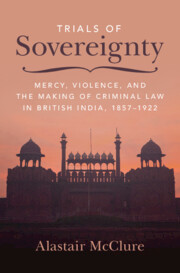Book contents
- Trials of Sovereignty
- Studies in Legal History
- Trials of Sovereignty
- Copyright page
- Dedication
- Contents
- Figures and Table
- Acknowledgments
- Abbreviations
- Introduction
- 1 Forgetting War and Punishing Crime
- 2 The Peace: The Queen’s Proclamation and the Politics of Forgiveness
- 3 The Code: Judges, Juries, and Punishing Difference
- 4 Discretion, the Death Penalty, and the Criminal Trial
- 5 Pardons and Scaffolds
- 6 Tilak’s Radical Innocence: Mercy, Sedition, and the State Trial
- 7 Gandhi’s Guilt and the Return of War
- Conclusion
- Epilogue
- Select Bibliography
- Index
- Studies in Legal History
6 - Tilak’s Radical Innocence: Mercy, Sedition, and the State Trial
Published online by Cambridge University Press: 20 November 2024
- Trials of Sovereignty
- Studies in Legal History
- Trials of Sovereignty
- Copyright page
- Dedication
- Contents
- Figures and Table
- Acknowledgments
- Abbreviations
- Introduction
- 1 Forgetting War and Punishing Crime
- 2 The Peace: The Queen’s Proclamation and the Politics of Forgiveness
- 3 The Code: Judges, Juries, and Punishing Difference
- 4 Discretion, the Death Penalty, and the Criminal Trial
- 5 Pardons and Scaffolds
- 6 Tilak’s Radical Innocence: Mercy, Sedition, and the State Trial
- 7 Gandhi’s Guilt and the Return of War
- Conclusion
- Epilogue
- Select Bibliography
- Index
- Studies in Legal History
Summary
This chapter focuses on the Noncooperation Movement (1920–1922) and, in particular, the role played by Mohandas Karamchand Gandhi. The NCM was the largest political movement for swaraj that India had ever seen. As the leader of this movement, Gandhi would demand noncooperators refuse mercy, and if necessary, sacrifice their lives in pursuit of political freedom. For Gandhi, it was only by reclaiming the right to die a political death that the satyagrahi could finally escape the label of the criminal and the category of rebellion. The chapter studies the place of mercy in Gandhian thought by paying close attention to his response to the Amritsar Massacre, his public speeches and writings, and his performance in his trial for sedition in 1922. As I argue, by embracing guilt and rejecting mercy, Gandhi threatened to finally explode the political conditions upon which imperial sovereignty had been organized.
- Type
- Chapter
- Information
- Trials of SovereigntyMercy, Violence, and the Making of Criminal Law in British India, 1857–1922, pp. 233 - 275Publisher: Cambridge University PressPrint publication year: 2024

